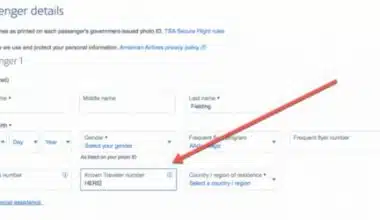Booking a flight is a pivotal step in planning any journey, and the question of how far in advance one can secure their travel arrangements often looms large. Understanding the booking window is key to finding the best deals and ensuring availability. Booking a flight up to 11 months in advance is recommended, but booking too early can be costly. Domestic flights should be booked 1-3 months in advance, unless during peak season or a popular holiday. Read more about this to gain a better understanding of how far out you can book a flight, including the number of days it takes.
How Far Out Can You Book a Flight?
You can book a flight up to 11 months in advance on most airlines. However, booking too early in that window can be an expensive mistake, second only in cost to booking at the last minute. It is advised to book domestic flights between 1 and 3 months in advance of your trip unless you are traveling during peak season or a popular holiday.
Events To Determine How Far Out You Can Book A Flight
Getting the best deals and availability on flights can be greatly influenced by the time of booking. Although there isn’t a universally applicable formula for determining the best moment to book a flight, the following are some recommendations:
#1. Domestic Flights
It is generally recommended to book domestic flights between one and two months, unless you are traveling during peak season or a popular holiday.
#2. International Flights
For international trips, it is advisable to book flights approximately 13–28 months.
#3. Award Flights
If you are planning to book award flights using points or miles, it is best to book as soon as possible. Award tickets for U.S. airlines become available at about the same time as tickets you can buy, and since there are limited award tickets on a given flight, waiting too long may result in missing out on the desired dates.
#4. Airline Policies
Each airline has its own policies regarding how far in advance they allow bookings. While most airlines allow bookings up to 11–12 months in advance, some may have shorter or longer booking windows. It’s a good idea to check the specific airline’s website or contact their customer service to confirm their booking window.
#5. Seasonal Variation
The timing for booking flights can vary based on the season and destination. For popular tourist destinations or during peak travel seasons, such as holidays or school breaks, it is advisable to book well in advance. This is because flights tend to fill up quickly during these times, and prices can increase as the departure date approaches.
#6. Flexible Dates
If you have flexible travel dates, you may have more options for booking further out. Many flight search engines and airline websites allow you to search for flights across a range of dates, which can help you find the best deals and availability.
#7. Special Events
If you are planning to travel for a specific event or conference, it is recommended to book as early as possible. These events often lead to increased demand for flights, and prices can rise significantly closer to the event date.
#8. Charter Flights and Package Deals
Charter flights and package deals, such as those offered by vacation package companies, often have their own booking windows. These types of bookings can sometimes be made much further in advance, up to two or even three years ahead of the departure date.
#9. Flight Schedules
Airlines release their flight schedules in phases, with a set number of months released at a time. For example, an airline might release flights for the next six months and then add more flights as time goes on. This means that if you are trying to book a flight more than six months in advance, you may not see all available options until the airline releases them.
#10. Last-Minute Bookings
While booking in advance is generally recommended, there are instances where last-minute bookings can offer good deals. Airlines sometimes offer discounted fares for unsold seats close to the departure date.
Benefits OF Booking Flights In Advance
#1. Lower Prices
One of the significant advantages of booking flights in advance is the potential for lower prices. Airlines often provide discounts for early bookings, especially when seats are still available. By booking ahead, you have a better chance of securing lower fares before they increase closer to the departure date.
#2. More Availability
Booking in advance gives you a wider range of flight options and better availability. As the departure date approaches, popular flights tend to fill up quickly, and the number of available seats decreases. By booking early, you have a higher chance of getting the desired flight times and dates.
#3. Flexibility in Seat Selection
When you book early, you have a better chance of selecting preferred seats. Many airlines allow passengers to choose their seats during the booking process, and the selection is often wider when booking in advance.
#4. Planning and Preparation
Booking flights in advance allows you to plan and prepare for your trip more effectively. It gives you ample time to arrange accommodations, transportation, and other travel-related arrangements. Additionally, early booking allows you to secure your travel plans, reducing the stress of last-minute arrangements.
#5. Connecting Flights and Itinerary Planning
If your travel involves multiple flights or connections, booking in advance allows you to plan your itinerary more efficiently. You can select flights with suitable layover times and ensure that you have sufficient time to make your connections without rushing.
#6. Group Travel
If you are traveling with a group of people, booking in advance ensures that you can secure seats together on the same flights. This is particularly important if you are traveling with family, friends, or colleagues and wish to sit together during the journey.
#7. Preferred Airlines and Routes
Booking flights in advance gives you a better chance of securing seats on your preferred airlines or specific routes. This is especially beneficial if you have a loyalty status with a particular airline or prefer certain airlines due to their service, amenities, or overall reputation.
#8. Travel during Peak Seasons
If you are planning to travel during peak seasons, such as holidays or school breaks, booking in advance becomes even more important. These periods often experience high demand for flights, and prices tend to rise significantly as the departure date approaches. By booking early, you can secure your seats at more reasonable prices.
#9. Peace of Mind for Busy Periods
If you have travel plans during busy periods, such as major events, festivals, or conferences, early booking provides peace of mind. It ensures that you have your flights secured and reduces the risk of availability issues or inflated prices due to high demand.
#10. Avoid Last-Minute Price Surges
Booking flights in advance helps you avoid last-minute price surges. As the departure date approaches, airlines often increase prices for unsold seats. By booking early, you can lock in lower fares and avoid potential price hikes that may occur closer to your travel date.
Disadvantages Of Booking Flights In Advance
#1. Lack of Flexibility
Booking flights in advance often comes with limited flexibility. If your plans change or you need to modify your travel dates, you may face restrictions or additional fees for changing or canceling your flight.
#2. Uncertainty in Travel Conditions
When booking flights far in advance, there is a level of uncertainty regarding future travel conditions. Factors such as weather, political situations, or global events can impact your travel plans. If unforeseen circumstances arise, you may need to make changes or cancel your flight, which can result in additional costs or complications.
#3. Missed Last-Minute Deals
By booking flights well in advance, you may miss out on last-minute deals that airlines offer closer to the departure date. Airlines sometimes reduce prices to fill unsold seats, and these discounted fares may not be available to those who have already booked in advance.
#4. Changes in Personal Circumstances
Life events or personal circumstances can change unexpectedly, leading to the need to modify or cancel your travel plans. If you have booked your flights far in advance, you may face challenges in making changes or obtaining refunds, depending on the airline’s policies.
#5. Limited Knowledge of Future Travel Needs
When booking flights well in advance, you may not have a complete understanding of your future travel needs. This includes factors such as the duration of your stay, specific activities or events you want to participate in, or changes in your travel preferences. Booking in advance may limit your ability to make adjustments based on evolving travel requirements.
#6. Potential Price Fluctuations
While booking in advance can sometimes secure lower prices, it is also possible that prices may fluctuate over time. In some cases, waiting until closer to the departure date may result in better deals or discounted fares. This can be a disadvantage for those who have already booked their flights well in advance.
#7. Potential Changes in Travel Preferences
Your travel preferences or circumstances may change over time. By booking in advance, you may miss out on new airline routes, better flight options, or more convenient travel arrangements that become available closer to your travel date.
#8. Potential Loss of Money in Case of Cancellations
If you need to cancel your flight after booking in advance, you may face cancellation fees or penalties. Depending on the airline’s policies and the type of ticket you purchased, you may not be eligible for a full refund. This can result in a financial loss, especially if you have to cancel due to unforeseen circumstances.
#9. Limited Access to Promotional Offers
Airlines often introduce promotional offers, flash sales, or discounted fares closer to the departure date. By booking in advance, you may miss out on these deals and end up paying more for your flight than if you had waited for such offers.
#10. Limited Knowledge of Future Travel Conditions
When booking flights far in advance, you may not have a complete understanding of future travel conditions. Factors such as travel restrictions, visa requirements, or health and safety concerns may change over time, affecting your travel plans.
Several Factors To Consider Before Booking A Flight In Advance
Considering these factors will help you make an informed decision and ensure that booking a flight in advance is the right choice for your travel plans.
#1. Travel Dates and Seasons
Consider the time of year you plan to travel. Peak travel seasons, such as holidays or summer vacations, may have higher demand and prices. Research the best time to book flights for your specific destination and aim to avoid peak travel periods if possible.
#2. Flight Prices and Deals
Research flight prices and monitor for any ongoing promotions or deals. Prices can fluctuate, so it’s beneficial to compare fares across different airlines and booking platforms. Keep an eye out for flash sales or discounted fares that may become available closer to your travel date.
#3. Flexibility of Travel Plans
Assess the flexibility of your travel plans. Booking in advance may limit your ability to make changes or cancel your flight without incurring additional fees or penalties. Consider any potential changes in your schedule or circumstances that may arise before your travel date.
#4. Itinerary and Connections
If your trip involves multiple flights or connections, ensure that you have sufficient time between flights to make the connections comfortably. Research the airports and their layouts to understand any potential challenges or delays that may arise during your journey.
#5. Travel Insurance
Evaluate the need for travel insurance and consider purchasing it to protect yourself against unforeseen events, such as trip cancellations, medical emergencies, or lost luggage. Review the coverage and terms of the insurance policy before making a decision.
#6. Visa and Entry Requirements
If you are traveling internationally, check the visa requirements for your destination and ensure that you have enough time to obtain the necessary visas before your travel date. Some countries may have lengthy visa processing times, so plan accordingly.
#7. Personal Circumstances
Consider any personal circumstances that may impact your travel plans, such as work commitments, family events, or health considerations. Assess the likelihood of any changes or conflicts that may arise before committing to book your flight.
#8. Airline Policies and Customer Support
Familiarize yourself with the airline’s policies regarding changes, cancellations, refunds, and customer support. Understand the terms and conditions associated with your ticket and be aware of any potential fees or restrictions that may apply.
#9. Affordability and Budget
Assess your budget and determine how much you are willing to spend on airfare. Consider the overall cost of your trip, including accommodations, transportation, meals, and activities, to ensure that booking a flight in advance aligns with your financial capabilities.
#10. Travel Documentation
Ensure that you have all the necessary travel documents, such as passports, visas, or any required health certificates, before booking your flight. Some destinations may have specific entry requirements or restrictions, so it’s important to have the appropriate documentation in order.
When Can You Book Flights For 2024?
You can book flights for 2024 around 11 months in advance, although the exact booking window may vary depending on the airline. Some airlines may allow you to book flights as far out as 11 months or close to a year, while others may have a shorter booking window. It’s recommended to start tracking flight prices and monitoring for promotions or deals as early as possible. Keep in mind that prices can fluctuate, and it’s advisable to compare fares across different airlines and booking platforms.
How Far Out Should You Book Flights For The Best Price?
To book flights for the best price, start searching and booking 1-3 months in advance for domestic flights and 2-8 months for international flights. Monitor prices using tools like Google Flights or Hopper. Book earlier during peak travel periods. Research, flexibility, and fare comparison are essential for finding the best deals.
Can You Book Flights A Year Out?
Most airlines do not allow you to book flights more than a year in advance. The booking window for most airlines is between six and 11 months before your departure date. While you cannot book a full year in advance, reserving your flight soon after the booking window opens can still provide you with the best prices and availability. It’s important to note that booking far in advance does not necessarily guarantee savings, as flight prices can fluctuate based on various factors.
What Day is the Best Day To Book a Flight?
There is no specific best day to book a flight. Popular beliefs, like booking on Tuesdays, are outdated or myths. Sales and competition can have an impact on flight prices, which fluctuate according to demand. However, Tuesdays and Wednesdays are generally considered the cheapest days to fly domestically, while Saturdays and Mondays may offer savings for international flights. It’s important to start searching early, use tools to monitor prices, and be flexible with travel dates.
Can You Book A Flight Two Years Ahead?
Most airlines allow you to book flights up to 11 months in advance for cash tickets. However, there are instances where booking even further in advance may be possible. For example, some travelers have reported booking staterooms or making reservations up to 2 years in advance for specific accommodations.
Conclusion
To make an informed decision when booking a flight in advance, it is pertinent to consider the factors listed in this writing. Research peak travel seasons, compare fares across airlines, assess flexibility, ensure sufficient time between flights, consider travel insurance, and consider visa requirements for international travelers. Booking flights in advance offers disadvantages such as limited flexibility, uncertainty in travel conditions, missed last-minute deals, and potential challenges in adjusting to unexpected life events or personal circumstances.
- HOW EARLY CAN YOU CHECK FOR A FLIGHT? All You Need To Know
- BEST TIME TO BOOK A HOTEL Save Money and Get the Best Deal
- HOW TO BECOME A FLIGHT NURSE: The Ultimate Guide
- CROSS COUNTRY ROAD TRIP: The Ultimate Guide to Planning and Enjoying the Adventure
- HOW MUCH DO FLIGHT NURSES MAKE? 2023 Salaries






